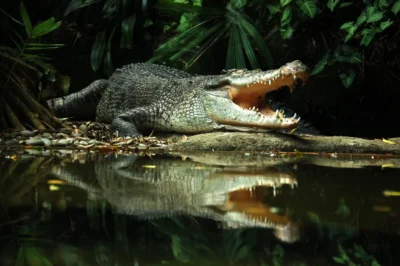Ever found yourself marveling at the incredible adaptations of the animal kingdom? Well, if you’ve ever wondered just how long can crocodiles hold their breath, you’re in for a fascinating journey into the world of these ancient reptiles.
Strap in as we dive deep into the aquatic prowess of crocodiles, exploring the astonishing duration they can stay submerged and the remarkable physiological features that allow them to navigate the watery realms with unparalleled expertise.
So, let’s take a breath and plunge into the intriguing question: How long can crocodiles hold their breath?
Fascination with Crocodile Behavior

The fascination with crocodile behavior stems from their unique and captivating characteristics, as well as their prominent place in various ecosystems. Here are some reasons why people find crocodile behavior intriguing:
- Ancient Existence: Crocodiles are often referred to as living fossils because they have been around for millions of years virtually unchanged. Their existence predates many other species, and studying their behavior provides insights into ancient ecosystems.
- Adaptations for Survival: Crocodiles are well-adapted predators with a set of remarkable features designed for survival. Their streamlined bodies, powerful jaws, sharp teeth, and excellent swimming abilities showcase the effectiveness of their evolutionary adaptations.
- Ambush Predators: Crocodiles are known for their ambush hunting style. They patiently wait for prey to come close before launching a sudden and powerful attack. Understanding their hunting techniques and strategies adds to the intrigue surrounding their behavior.
- Parental Care: Some species of crocodiles exhibit impressive parental care, which is uncommon among reptiles. Female crocodiles are known to guard their nests and protect their hatchlings, showcasing a level of parental behavior that goes beyond the typical reptilian approach.
- Communication and Social Structure: Crocodiles engage in various forms of communication, including vocalizations, body language, and posturing. Some species exhibit social behaviors, forming groups or congregating during specific times, providing insights into their social structures.
- Ecological Importance: Crocodiles play a crucial role in maintaining ecological balance. As apex predators, they help control prey populations, preventing overgrazing and maintaining the health of ecosystems. Understanding their behavior contributes to conservation efforts and ecosystem management.
- Survival Tactics: Crocodiles are known for their impressive survival tactics. They can survive in various environments, from freshwater rivers to saltwater estuaries, and some species are capable of traveling long distances overland. Studying how they adapt to different conditions is of great interest to researchers.
- Mythology and Folklore: Crocodiles have a significant presence in the mythology and folklore of various cultures. Their powerful and enigmatic nature has led to the creation of numerous myths and stories, further fueling the fascination with these creatures.
Overall, the study of crocodile behavior offers a fascinating glimpse into the world of ancient reptiles and their adaptations, providing valuable insights for both scientists and enthusiasts alike.
How long can crocodiles hold their breath
Crocodiles are well adapted to spending time in the water, and their ability to hold their breath is impressive. They can hold their breath for extended periods, with some species capable of remaining submerged for 30 minutes to over an hour. The exact duration varies among different species and factors such as the crocodile’s size, age, and activity level.
One of the key adaptations that allow crocodiles to stay submerged for extended periods is their ability to slow down their heart rate and metabolic processes while underwater. This allows them to conserve oxygen and survive without needing to come up for air frequently.
It’s important to note that while crocodiles are excellent swimmers and can hold their breath for a long time, they also spend a significant amount of time basking in the sun on the water’s edge to regulate their body temperature and aid digestion.
Physiology of Crocodile Respiration
Factors Influencing Crocodile Breath-Holding Ability



